NAIROBI, Kenya: An elite Kenyan police unit went on trial Tuesday on charges of wrongful death in the killing of an outspoken Pakistani journalist in Nairobi a year ago. The case was jointly filed by the journalist’s widow and two Kenyan journalists’ unions.
Arshad Sharif was killed Oct. 23, 2022, when the car he was in with another Pakistani man sped up and drove through a roadblock checkpoint outside the Kenyan capital and police opened fire. Nairobi police at the time expressed regret over the shooting, saying it was a case of “mistaken identity” during a search for a similar car involved in a child abduction case.
The 50-year-old journalist had fled Pakistan earlier that year to avoid arrest at home on charges of maligning Pakistan’s national institutions — a phrase used for critics of the powerful military, which has ruled Pakistan for half of its 75-year history. He stayed briefly in Dubai, the United Arab Emirates and the United Kingdom before arriving in Kenya.
A team of Pakistani investigators later said Sharif’s killing was a “planned assassination.” His widow, Javeria Siddique, filed the case against the Kenyan police unit, known as the General Service Unit or GSU, that was involved in the shooting.
Kenyan police claimed Sharif did not stop at a roadblock on the outskirts of Nairobi but his family and Pakistani investigators disagreed, saying Shariff’s killing was planned in Pakistan. Pakistani officials have denied any involvement.
“I am suing the GSU because they committed the crime openly,” Siddique said earlier in a phone interview with The Associated Press. “For me, it was a targeted assassination because he was living in hiding in Kenya after receiving threats in Pakistan.”
The case is being heard at the Kajiado High Court on the outskirts of Nairobi and along with Siddique, the Kenya Union of Journalists and the Kenya Correspondents have been listed as joint petitioners.
The plaintiffs’ submission to court accuses Kenyan authorities of “failing to prosecute officers involved in the wrongful death of Arshad” and demands “a public apology to the family of Sharif.”
“It has taken us some time to go to court because we thought investigations will be carried out, and the officer who pulled the trigger prosecuted,” a statement from the union said. “Nothing so far has happened, so we are justified to go to court.”
Ochiel Dudley, the lawyer representing Shariff’s widow, said his legal team is “assisting the family to pursue justice in Kenya.”
In Islamabad, police have charged two Kenyan-based Pakistani businessmen who had hosted Sharif in the East African country with involvement in his killing.
The case has drawn international criticism from rights groups.
“Arshad Sharif was politically persecuted in Pakistan and sought safety in Kenya, only to meet death,” said Muthoki Mumo, the Committee to Protect Journalists’ sub-Saharan Africa representative.
“A year later, Kenyan authorities have dismally failed in their responsibility to credibly and swiftly investigate the killing,” she added. “His family and colleagues deserve justice, and a more credible accounting of the circumstances surrounding his death than the dubious story provided by the police.”
























